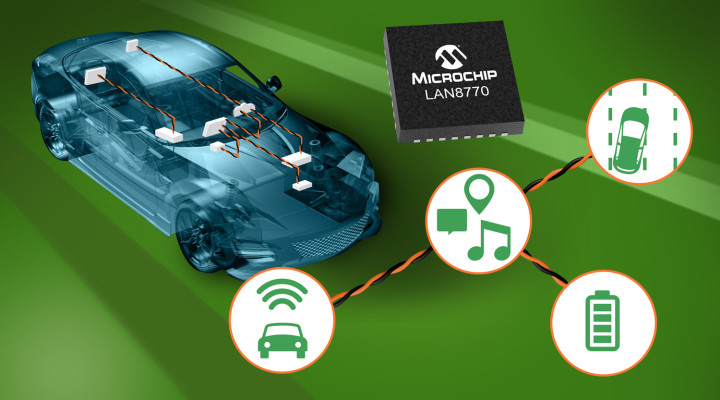Single-pair Ethernet PHY Offers the Industry’s Leading Ultra-low TC10-compliant Sleep Current
July 28, 2020
on
on
A ubiquitous Ethernet architecture simplifies the design, configuration, and control of many different applications. This is especially true for connected mobility that requires more high-speed data delivery than ever before. Automotive networks rely heavily on partial networking in which some segments are hibernated and woken up on demand. Microchip Technology Inc., a leader in automotive Ethernet, today announced the LAN8770, an OPEN Alliance TC10 sleep standard Ethernet physical layer transceiver (PHY) with the industry’s lowest sleep current—less than 15 µA—which is around four times lower than other available devices.
The LAN8770 is a compact, cost-effective, single-port 100BASE-T1 Ethernet PHY compliant with the IEEE 802.3bw-2015 specification and available in a 5 x 5 mm or 6 x 6 mm wettable-flanks QFN package. The small package is ideal for space-constrained applications such as the infotainment head unit, telematics modules or Advanced Driver Assistance Systems (ADAS). It provides 100 Mbps transmit and receive capability over a single Unshielded Twisted Pair (UTP), exceeds automotive electromagnetic interference requirements and is Grade 1 (-40°C to +125°C) automotive AEC-Q100 qualified. In addition, the LAN8770 is Microchip Functional Safety Ready; it is specifically designed to simplify customers’ end-product ISO26262 safety certification with the support of specialized hardware safety features, Failure Modes, Effects, and Diagnostic Analysis (FMEDA) and safety manual.
The LAN8770M and LAN8770R support communication with an Ethernet MAC via standard MII/RMII and MII/RMII/RGMII interfaces, respectively. An optional 125 MHz or 50 MHz reference clock output is also provided for RGMII and RMII applications, often enabling elimination of an external reference clock.
“Typically, an automotive module can only consume 100 microamps maximum in sleep (battery) mode so, if the PHY alone consumes north of 50 microamps, additional circuitry is required to avoid exceeding the target power budget,” said Charles Forni, vice president of Microchip’s USB and Networking business unit.
“Often, applications add an additional wire or CAN bus just to enable and disable the power. Our PHY avoids such a need, minimizing components, installation and cost.”
Microchip’s LAN8770 EtherGREEN™ energy efficiency technology provides low-power operation along with ultra-low-power sleep and wake-up modes. Power efficiency is further enhanced with optional integrated linear regulator and Microchip’s flexPWR® technology for variable xMII and input/output supply voltages, providing flexible design options and more opportunities to save power.
A separate 100BASE-T1 to 100BASE-TX Media Converter evaluation kit is available now. A 100BASE-T1 daughter card evaluation board is available for use with Microchip’s ATSAMV71-XULT Xplained Ultra microcontroller kit as well as the SAMA5D3-EDS microprocessor kit.

The LAN8770 is a compact, cost-effective, single-port 100BASE-T1 Ethernet PHY compliant with the IEEE 802.3bw-2015 specification and available in a 5 x 5 mm or 6 x 6 mm wettable-flanks QFN package. The small package is ideal for space-constrained applications such as the infotainment head unit, telematics modules or Advanced Driver Assistance Systems (ADAS). It provides 100 Mbps transmit and receive capability over a single Unshielded Twisted Pair (UTP), exceeds automotive electromagnetic interference requirements and is Grade 1 (-40°C to +125°C) automotive AEC-Q100 qualified. In addition, the LAN8770 is Microchip Functional Safety Ready; it is specifically designed to simplify customers’ end-product ISO26262 safety certification with the support of specialized hardware safety features, Failure Modes, Effects, and Diagnostic Analysis (FMEDA) and safety manual.
The LAN8770M and LAN8770R support communication with an Ethernet MAC via standard MII/RMII and MII/RMII/RGMII interfaces, respectively. An optional 125 MHz or 50 MHz reference clock output is also provided for RGMII and RMII applications, often enabling elimination of an external reference clock.
“Typically, an automotive module can only consume 100 microamps maximum in sleep (battery) mode so, if the PHY alone consumes north of 50 microamps, additional circuitry is required to avoid exceeding the target power budget,” said Charles Forni, vice president of Microchip’s USB and Networking business unit.
“Often, applications add an additional wire or CAN bus just to enable and disable the power. Our PHY avoids such a need, minimizing components, installation and cost.”
Microchip’s LAN8770 EtherGREEN™ energy efficiency technology provides low-power operation along with ultra-low-power sleep and wake-up modes. Power efficiency is further enhanced with optional integrated linear regulator and Microchip’s flexPWR® technology for variable xMII and input/output supply voltages, providing flexible design options and more opportunities to save power.
Development Tools
Advanced PHY diagnostics provide the user with troubleshooting capabilities through Microchip’s integrated LinkMD® cable diagnostic system designed to detect cable defects, shorts or opens. The device also provides a receiver Signal Quality Indicator (SQI), over-temperature and under-voltage protection and comprehensive status interrupt support along with various loopback and test modes. The PHY family is backed by Microchip’s free LANCheck® online design service that reviews customer designs, ensuring that best design practices are used. AUTOSAR®, Linux® and RTOS software drivers are also available.A separate 100BASE-T1 to 100BASE-TX Media Converter evaluation kit is available now. A 100BASE-T1 daughter card evaluation board is available for use with Microchip’s ATSAMV71-XULT Xplained Ultra microcontroller kit as well as the SAMA5D3-EDS microprocessor kit.

Read full article
Hide full article



Discussion (0 comments)